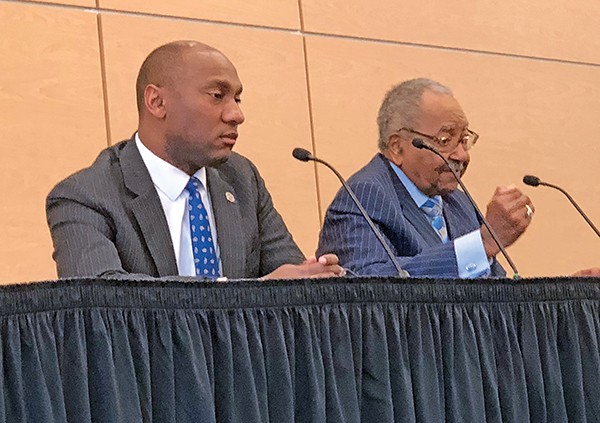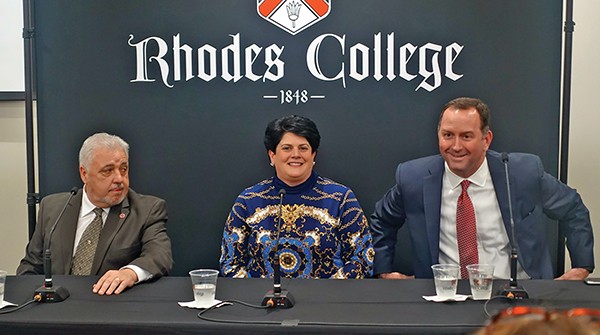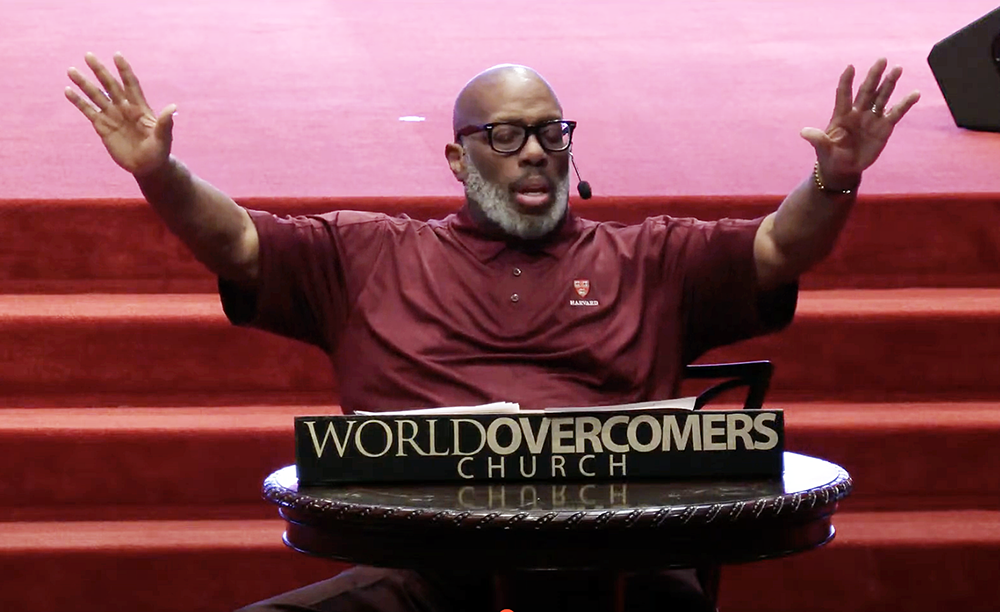One of the busiest and most crucial county elections in local history is taking place right now, with early voting that began on April 11th and will end on April 26th. This first round of the local election process terminates on election day — May 1st.
Two primary slates — Republican and Democratic — will vie to select nominees for a chief executive to head county government, along with various county department heads and the members of the 13-member Shelby County Commission. A two-term limit provision in the county charter, coupled with at least one voluntary decision to eschew reelection, means that voters will be electing seven new members to the commission, a majority.
This potential sea change occurs in the middle of serious alterations in the relationship between city and county, with the state legislature threatening to impose some version of de-annexation upon Memphis’ recently added territories, making them once again the county’s financial responsibility — and with the city compounding the dilemma by vowing to make no new sewer connections outside city limits.
A further complication facing county government is a possible carry-over of an ongoing power struggle between current county Mayor Mark Luttrell and the present commission over a commission majority’s insistence on a greater share of fiscal oversight and demand for an independent attorney for the legislative body. Both matters remained snagged on Monday, in this week’s regular commission meeting.
All that being the background, here are the elective positions and the candidates seeking them this year.
Shelby County Mayor — There are serious races among Republicans and Democrats for the right to head county government. The Republican candidates are Trustee David Lenoir, county Commissioner Terry Roland, and Juvenile Court Clerk Joy Touliatos. The Democrats are state Senator Lee Harris and Sheriff’s Department employee and longtime political broker Sidney Chism, who has served both as a commissioner and as an interim state senator.
Although both sets of candidates have been matched against each other in various public forums and the general election race between the two primary winners could well turn out to be a barn-burner, the Republican race has so far drawn the most attention.
From the beginning, Lenoir, far and away the leader in fund-raising, was regarded in most circles as the favorite. An impressive but not flamboyant personality who once was a defensive end for the Alabama Crimson Tide and brought a background in financial services to his office, he has, by most accounts, served competently and efficiently as the county’s chief banker and tax collector and has established various innovative outreach programs.
Roland, a Millington store owner who worked for more than a decade as a rodeo performer, still has roughneck aspects to his personality but is a far more serious (and centrist) public figure than the caricatured version of him in some circles would suggest. Though his position on social issues like abortion and LGBTQ rights is still far to the right of the spectrum, Roland functioned as a facilitator during the year he served as commission chair and was instrumental in calling for a disparity study and establishing the county’s new MWBE (minority and women’s business enterprise) program for equity in county contracts. Along with current chair, Heidi Shafer, he has been in the forefront of the commission power struggle with Luttrell and sees himself at odds with established interests generally.
Touliatos has been fairly low profile as Juvenile Court clerk but has been at the helm during years of significant reform at the court and, as she likes to tell audiences, has steadily worked her way up through a variety of county-government positions. Behind a gracious public exterior, she is a worker bee by nature and served as a vital cog in the successful 2015 election campaign of Memphis Mayor Jim Strickland. Her campaign has stressed such elements as crime control and harmony between the elements of county government.

Lee Harris (left) and Sidney Chism at NAACP forum

and David Lenoir at Rhodes College forum
On the basis of his conspicuous place in the public arena and his unrivaled ability to generate free media, Roland was regarded as the early leader in the GOP race but has lagged well behind both Lenoir (whom Roland calls “Mr. Drysdale” after the banker character in The Beverly Hillbillies) and Touliatos in fund-raising and support from the party establishment.
In one of the race’s late developments, copies of a 1999 petition for divorce by Lenoir’s wife Shannon were distributed anonymously to selected Republicans and members of the media. (The couple did divorce but remarried several years later and make regular church appearances on behalf of issues relating to marital fidelity and mutual support.) At least two independent attempts by recipients to trace the source of the mailout appeared to lead to a member of Touliatos’ campaign group, but Touliatos herself said she had no knowledge of any such involvement by her campaign and said her only awareness of the Lenoirs’ divorce matter came from the fact that she had been one of the recipients of the petition.
There has been conspicuously less sturm und drang between the two Democratic candidates, though at his formal announcement of candidacy last November, Chism (who had been running for a year, more or less, already) accused Harris of being a tool of “the fat boys that make the decisions for this town” and vowed to “beat up on him, morning, noon, and night.” The two were all sweetness and light to each other at a recent forum sponsored by the NAACP and agreed on virtually all matters, including that of establishment “fat boys,” with Harris doing the populist turn this time, condemning most financial incentives (PILOTs, TIFs, etc.) for attracting industry as “transferring tax money to corporate interests.”
The real heyday of Chism, whose involvement with local politics began decades ago, was when he was a Teamster liaison to the worlds of politics and government, and reached its height during the Memphis mayoral tenure of Willie Herenton, his close friend and ally. He was always able to walk the tightrope between a red-eyed populist rhetoric and pragmatic relationships with such mainstream political types as Bartlett banker Harold Byrd and current Memphis Mayor Jim Strickland, and he served briefly in the 1990s as chairman of the Shelby County Democratic Party. Another distinction was that he was elected to serve two consecutive terms as chairman of the county commission. Though after leaving the commission in 2014, Chism has kept his hand in the game and continues to preside over an annual summer picnic for political types, his influence, focused on his home base of South Memphis, is not what it once was. Simultaneously, his support across party lines for political figures like Sheriff Bill Oldham, his current employer, put him in the line of fire for Democratic purists.
Nevertheless, Chism keeps keeping on, though he is up against it in his duel for votes with the relatively youthful Harris, a polished speaker who teaches law at the University of Memphis and has a talent for galvanizing support for issues appealing to political crossover types. During his truncated single term on the city council, Harris led the fight for an ordinance requiring equity in hiring and contracting for LGBTQ individuals, and his abundant list of issues in the state Senate — where he has served as minority leader for that body’s small band of Democrats — have included environmental protection, voting rights, criminal justice reform (in tandem with GOP members), and, once again, LGBTQ rights. He also lent time and effort to the drive to divest his home city (and the state) of monuments to the Confederacy.
Harris wears his ambition on his sleeve, a personality characteristic that may put off some while, to others, it testifies to his candor and determination to have a maximum public impact. He also has done his homework on county-specific problems. Chism may not like it, but Harris is openly regarded by many local Democrats as their nominee-in-waiting. If elected county mayor, he will be reckoned as having good chances to hold his own against whomever the Republicans nominate, thereby ending — or at least braking — a counter-intuitive but all-too-real Republican domination of countywide elections in recent years.
Register of Deeds — Wayne Mashburn, who was term-limited as county clerk, is the lone Republican running. The two Democrats seeking the position are Adrienne Pakis-Gillon, a veteran and well-respected party activist, and newcomer Shelandra Ford. In her campaign appearances, Pakis-Gillon has consistently lamented the fact that the position of Register comes last on the ballot. Presumably she (and Ford) will appreciate that it is mentioned first here.
Sheriff — The position of Shelby County’s chief law enforcement officer is one that places a premium on preparedness, and candidates for it must be certified as eligible under requirements monitored by theTennessee Peace Officers Standards and Training (POST) Commission. The FBI-trained Republican candidate, unopposed in his primary, is Dale Lane, a repeat candidate from eight years ago, who began his career as a Millington patrolman, occupied several administrative positions in the Sheriff’s Department, and in recent years, has served as director of the Shelby County Office of Preparedness.
Two Democrats are vying for the right to oppose Lane in August: One is Bennie Cobb, another prior candidate and the owner of a security and training firm. He is a retired captain from the Shelby County Sheriff’s office. Another, widely considered the favorite in his primary, is Floyd Bonner, who has headed numerous divisions in the Sheriff’s Department and is the current chief deputy to Sheriff Bill Oldham, and carries the endorsement of Oldham, a Republican.
Trustee — Back in 2010, the first of several successive sweep elections for Republican countywide candidates, Regina Morrison Newman, the Democrat who had been appointed to fill the term of the late Trustee Paul Mattila, was a clear favorite. After her surprise defeat, lawyer Newman, a veteran of several financial-management jobs in state and local government, went on to serve as a deputy city attorney before resuming private practice. Aspiring to return as trustee, she now faces two primary opponents, Derrick Bennett, who has a background as an activist in both major political parties and has run for various offices, and Joseph Lee III, a veteran of the Herenton administration in city government, where he served as chief financial officer and later as CEO of MLGW. Newman has her work cut out for her again.
Among Republicans, county Commissioner George Chism, who has a background in mortgage banking is the presumed favorite over Dexter Orman, a self-employed CPA who has his own firm.
Assessor — Both major parties have contests for this key position, charged with determining the correct values for county property and with providing property owners channels for appeal of these appraisals, which form the basis for property taxes.
Republican candidates include lawyer Keith Alexander, a Central Gardens resident and critic of the appraisal process, and Robert “Chip” Truoy, a 32-year employee of the office, whose considerable experience with the appraisal process over the years may give him an edge. On the Democratic side, Melvin Burgess, term-limited after service on the county commission, and a veteran auditor with Memphis/Shelby County Schools, has the edge in name recognition and support over activist Lorie Ingram.
Probate Court Clerk — This is one of those positions that will be contested pretty seriously in August, when the Republican winner is matched against the Democratic candidate, City Councilman Bill Morrison, who is unopposed in his primary. The GOP contest is a three-way affair, featuring incumbent Paul Boyd, former incumbent Chris Thomas, and George “Dempsey” [Summer]. Boyd, an African American and a dedicated Republican activist for years, won the seat in 2010 when Thomas, expecting a countywide Democratic tide, opted to run instead for a safely Republican County Commission district, leaving Boyd to become the beneficiary of a surprise GOP sweep. Predictions on a winner are split, but Thomas has a fair chance of regaining his job.
Criminal Court Clerk — The Republican incumbent, Richard De Saussure III, who was appointed to succeed his former boss, Kevin Key, in 2014, is unopposed. There are three Democrats running: Heidi Kuhn, a Sheriff’s Department employee and model; Carla Stotts-Hills, a longtime party activist and sister of the late Judge Rita Stotts; and a newcomer named Amanda Scott Hill, whose name is close enough to that of the relatively well-known Stotts-Hills that supporters of the latter fear Hill could be the source of voter confusion.
Juvenile Court Clerk — Spirited races are on tap for both the Democratic and Republican primaries. Memphis City Council member Janis Fullilove, Morrie E. “Jimmy” Noel, and Shelby County School principal Harold Smith are running as Democrats. The Republicans are Robert Hill, who serves as an aide to County Trustee David Lenoir, and Bartlett alderman Bobby Simmons.
Circuit Court Clerk — Of the four Republicans running, the clear favorite is Tom Leatherwood, the former state senator and longtime county register, who was term-limited in the latter position. Other GOP candidates are Michael Finney, John Lackey, and Steve Moore. Democrats running are newcomer Temika Gipson and veteran Democrat Del Gill.
County Clerk — Wanda Halbert, the former longtime city council and school board member, is the best known of three Democratic candidates; the others are Jamal Whitlow and Mondell B. Williams. Republican candidates are Donna Creson, Soheila N. Kail, whose husband, Danny Kail, had earlier ventured to run but deferred to her candidacy, and Arnold Weiner, a longtime rank-and-file party activist.
See also Politics for a rundown on County Commission races.





